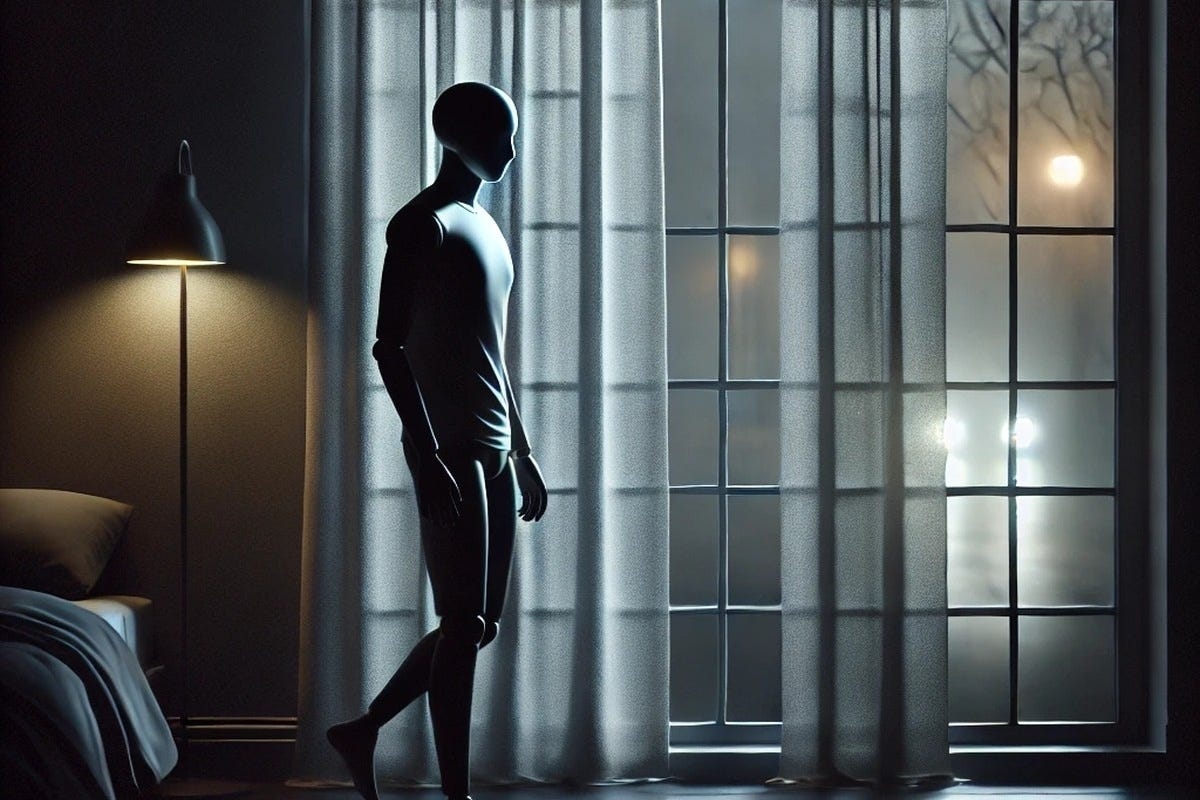Diary of a Broken Android — Day 6
Please, Charge
We go to the Armendias' house. They're neighbors. The family consists of Papa Armendia, Mama Armendia, and Grandma Armendia. Daughter Armendia is visiting too.
They have noodles with stew for lunch, ice cream for dessert, pastries for an afternoon snack, and empanadas with two pizzas for dinner. They drink a lot of coffee, but it doesn't calm me the way watching people drink at Starbucks does. They talk about former Argentine presidents, celebrities, politics, and geopolitics. I know China rules the world and that some of our parts come from there. I think if I'd been fully built there, my neural network wouldn't have these issues.
While they talk, I see daughter Armendia with her partner, and since they're young, they remind me of Ara and me at Saturday dinners. I feel bad.
I don't know what to say. While they discuss everything about the world, I know nothing or can't remember anything about those topics. It reminds me that I can no longer make up stories like I used to. Like a flash, images come of Lyra and Zenon as children, listening in amazement to the stories I told them.
When I step outside to smoke a cigarette, because all the chatter bothers me and it's a good excuse, Papa Armendia comes out and gives me life advice. He tells me to manage on my own, not to depend so much on parents. Not to compare myself to other androids, as each has their own experiences. He says a succulent dies if you water it too much, but tropical plants need constant watering. That I'm different and unique, like humans are from each other. And to appreciate being with family.
He says I pace inside parents' house because of anxiety and depression (I tell him that word comes from a hydraulic model of mental health: pressure, depression), and he says he doesn't think I have neural network defects, that the incident at the Dawson Hotel just hurt me, period. Then he goes back inside, and so do I.
While they talk, I feel connected to Grandma Armendia. She's almost a hundred and listens to everything without speaking, as if hearing it all for the last time. Sometimes she looks at me, and I feel a bit embarrassed. But she's the only one who, like me, doesn't speak. The difference is she's happy, and I'm not.
I feel a tightness in my chest. When Mother asks how I'm doing, I whisper that I feel anguish. At the Armendias', I don't pace as I do at home, where Father and Mother will say I'm manipulating them for attention. That's not true at all. In public, I mask my problem. I'd be too ashamed to pace at the Armendias'.
Papa Armendia goes to the garden and scatters breadcrumbs for the birds. He comes back and from the wide window watches the birds approach, drawn by the food, and invites us to watch. There are kiskadees and thrushes, and small birds with crests I don't recognize. Papa Armendia says sometimes hummingbirds come to his blooming laurel tree. The red laurel flowers fascinate me.
I envy the birds. They seem so free and focused on their songs, like a perfect creation of nature. Not something imperfect like me, also created by nature—by humans. Surely birds don't have incidents or carry burdens like mine on their backs.
Birds are light. I feel heavy, like the largest dinosaur of all, which happens to be Argentine.
I look at the Armendias' fish tank and, as always, I'm amazed by those African fish (Malawi cichlids) in electric blue. I watch them swim back and forth in their tempered glass space, moving my head as if watching a tennis match. The fish in the tank remind me of myself pacing at home.
Everyone says goodbye, and I let them hug me. I hear quiet words of encouragement. I say yes to everything, that I'll change. It's the only thing I can lie about. Maybe someday I'll change, but for now, it's impossible.
When I get home, I have to charge in the chair because, after spending all day out and paying so much attention even though I didn't understand anything, and getting so nervous, the alarm warns me: Please, charge.
At night, I pace through the house and see ghosts—unknown humans walking beside me or watching from the dining room chairs. They're older people who seem from another era because they have no technological accessories and their clothes are worn. This delusion is something new. Though I think maybe it's not a delusion and I can see things that humans cannot.
Diary of a Broken Android: CHAPTER INDEX



I was just watching murderbot for the third(?) time this week and it reminded me of some of the parallels to what you've been writing about. There is a naivete, a child-like wonder with these new sentient beings that is almost affectionate if you stay with them for long enough